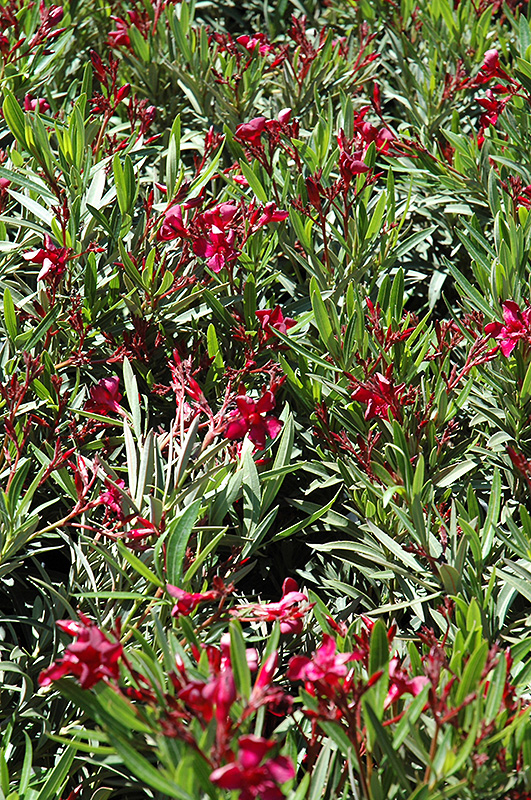Dwarf Red Oleander Nerium oleander 'Dwarf Red' Height: 4 feet Spread: 4 feet
Sunlight:
Hardiness Zone: 8a Other Names: Little Red Oliander, Rose Bay Description: A smaller, dwarf variety producing volumes of red flowers in summer; great summer color for a smaller area; often used as a patio plant; pruning required to maintain strong structure; parts of this plant are known to be toxic Ornamental Features Dwarf Red Oleander features showy clusters of red star-shaped flowers at the ends of the branches from early to late summer. It has grayish green evergreen foliage which emerges green in spring. The narrow leaves remain grayish green throughout the winter. Landscape Attributes Dwarf Red Oleander is a multi-stemmed evergreen shrub with an upright spreading habit of growth. Its relatively fine texture sets it apart from other landscape plants with less refined foliage. This is a high maintenance shrub that will require regular care and upkeep, and can be pruned at anytime. Deer don't particularly care for this plant and will usually leave it alone in favor of tastier treats. Gardeners should be aware of the following characteristic(s) that may warrant special consideration; Dwarf Red Oleander is recommended for the following landscape applications; Planting & Growing Dwarf Red Oleander will grow to be about 4 feet tall at maturity, with a spread of 4 feet. It has a low canopy. It grows at a fast rate, and under ideal conditions can be expected to live for approximately 20 years. This shrub does best in full sun to partial shade. It is very adaptable to both dry and moist locations, and should do just fine under average home landscape conditions. It is considered to be drought-tolerant, and thus makes an ideal choice for xeriscaping or the moisture-conserving landscape. It is not particular as to soil pH, but grows best in poor soils, and is able to handle environmental salt. It is highly tolerant of urban pollution and will even thrive in inner city environments. This is a selected variety of a species not originally from North America, and parts of it are known to be toxic to humans and animals, so care should be exercised in planting it around children and pets.![]()
![]()
![]()
![]()
![]()
![]()
![]()
![]()
![]()
![]()
![]()
![]()
![]()
top of page
Louie's Nursery Menifee - Plant Finder
Characteristics
Applications
Features & Attributes
This tool is an online resource representing many of the varieties that we carry over the course of the season, and is intended for informational purposes only. Inventory varies seasonally, so we cannot guarantee that every plant will be in stock at all times - please contact the store directly for current availability. It does not include our entire selection of plants, so be sure to visit our store to see varieties that may not be represented on this list.
bottom of page
